Kajian

Studi Kasus: Sarana Air Minum Berbasis Masyarakat di Cianjur, Jawa Barat
2008
1.078
ESP, PDAM Cianjur dan Politeknik Negeri Bandung membantu warga Kampung Tanjakan Kulon, Desa Padaluyu, Cianjur membangun sarana air minum bersih yang lebih dekat dengan pemukiman penduduk.
Perpustakaan ESP (Environmental Services Program), Ratu Plaza Office Building 17th floor, Jl. Jendral Sudirman Jakarta Selatan, Telp: 021-7209594 (Biyan).

Studi Kasus: Sarana Sanitasi Berbasis Masyarakat di Kabupaten Bandung, Jawa Barat
2008
1.196
Proyek ESP di Mekarjaya bertujuan memberdayakan masyarakat untuk membangun sarana sanitasi dan air bersih komunal
Perpustakaan ESP (Environmental Services Program), Ratu Plaza Office Building 17th floor, Jl. Jendral Sudirman Jakarta Selatan, Telp: 021-7209594 (Biyan).

Studi Kasus: Pengelolaan Sampah Berbasis Masyarakat di Jawa Barat
2008
1.193
ESP mengajak masyarakat di Jawa Barat mengelola sampahnya dengan baik dan benar
Perpustakaan ESP (Environmental Services Program), Ratu Plaza Office Building 17th floor, Jl. Jendral Sudirman Jakarta Selatan, Telp: 021-7209594 (Biyan).

Studi Kasus: Pengelolaan Sampah Berbasis Masyarakat di Surabaya, Jawa Timur
2008
1.085
Pengelolaan sampah berbasis masyarakat memungkinkan warga menentukan sendiri jenis pengelolaan sampah yang sesuai dengan kebutuhan dan kemampuan mereka
Perpustakaan ESP (Environmental Services Program), Ratu Plaza Office Building 17th floor, Jl. Jendral Sudirman Jakarta Selatan, Telp: 021-7209594 (Biyan).

Studi Kasus: Rencana Strategis Sanitasi Kota Yogyakarta, D.I. Yogyakarta
2008
1.187
Salah satu program ESP adalah memberikan fasilitasi kepada Pemerintah Kota Yogyakarta dalam penyusunan Rencana Strategis Sanitasi Kota Yogyakarta
Perpustakaan ESP (Environmental Services Program), Ratu Plaza Office Building 17th floor, Jl. Jendral Sudirman Jakarta Selatan, Telp: 021-7209594 (Biyan).
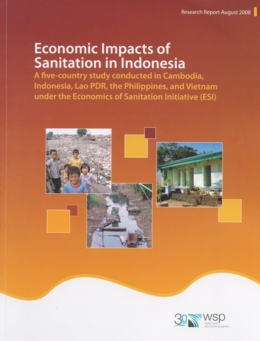
Economic Impacts of Sanitation in Indonesia: A five-country study conducted in Cambodia, Indonesia, Lao PDR, the Philippines, and Vietnam under the Economics of Sanitation Initiatives (ESI)
Agustus Th 2
1.225
This is the first study in Indonesia to compile economic evidence on a range of impacts of poor sanitation and hygiene. The results indicate that poor sanitation and hygiene have significant financial and economic costs, with major implications for the socio-economic development of Indonesia and the attainment of short, medium, and long term development goals. The study highlights the links betwen improved sanitation and several other MDG targets, including poverty, hunger reduction, gender quality, child health, access to safe drinking water, and the quality of life of slum-dwellers.
The study demonstrates that poor sanitation affects everyone, but especially the poor and vulnerable, including children, women, the disabled and senior citizens. Hence, sanitation should receive greater attention from all levels of Indonesian government, and from development partners, the private sector and households. Decision makers should act now, and in a concerted way, to stimulate demand for improved sanitation and hygiene practices, at the same time increasing the opportunities for households to safisfy their demand.
Table of Contents:
Executive Summary
Foreword
Abbreviations
Acknowledgements
Table of Contents
1. Introduction
2. Methods
2.1 Study Approach
2.2 Scope of Sanitation
2.3 Impacts evaluated
2.4 Impact mitigation
3. Results
3.1 Summary of Economic impacts of poor sanitation
3.2 Health impacts
3.3 Water resource impacts
3.4 Environment
3.5 Other welfare impacts
3.6 Tourism Impacts
3.7 Sanitation Markets
4. Recommendations
Annexes
Annex A: Algorithms
Annex B: National Data Inputs and Results
Annex C: Provincial Data Inputs and Results
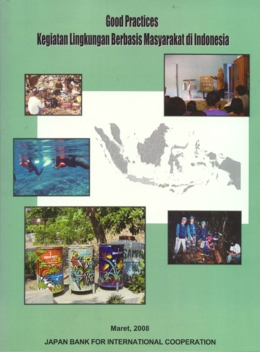
Good Practices Kegiatan Lingkungan Berbasis Masyarakat di Indonesia
Th.
1.327
Pustaka ini memperkenalkan 21 good practices dalam kegiatan lingkungan berbasis masyarakat di Indonesia. Pustaka ini disusun sebagai sarana untuk berbagi pengetahuan dan pengalaman dalam kegiatan lingkungan berbasis masyarakat, untuk para pakar yang terlibat dalam pendidikan lingkungan dari lembaga-lembaga terkait, termasuk instansi pemerintah pusat dan daerah, LSM, perusahaan swasta dan lembaga donor, agar kegiatan lingkungan dapat mengalami peningkatan lebih lanjut.
Bidang-bidang kegiatan lingkungan yang disebutkan dalam pustaka ini pada dasarnya meliputi konservasi hutan, konservasi air dan tanah, konservasi ekosistem, dan pengelolaan sampah dengan 3R. Fokus utama pada 15 dari 21 good practices adalah pengelolaan limbah dengan 3R, karena terbatasnya informasi dan studi mengenai isu ini.
Daftar isi:
I. Pengelolaan Sampah dengan 3R
1. Pengelolaan Sampah Terpadu di Banjarsari, Cilandak, Jakarta Selatan
2. Pengelolaan Sampah Terpadu di Perumahan Mustika Tigaraksa, Tangerang
3. Desentralisasi Pengelolaan Sampah di Bukit Kencana Jaya, Semarang
4. Pengelolaan Sampah Terpadu di Surabaya (Menggunakan Metode Home Methode Takakura)
5. Pengelolaan Kompos di Kebun Karinda, Lebak Bulus, Jakarta Selatan
6. Pengelolaan Sampah Terpadu di Pondok Pekayon Indah, Bekasi Selatan
7. Pengelolaan Sampah Terpadu di Kampung Sukunan, Sleman, Yogyakarta
8. Penjualan Kompos sebagai Peluang Bisnis di Jawa Barat
9. Manajemen Kompos “Mutu Elok” di Perumahan Cipinang Elok Settlement, Jakarta Timur
10. Usaha Kompos Cair di Cempaka Baru, Jakarta Pusat
11. Pengelolaan Sampah Terpadu di Kampung Rawajati, Pancoran, Jakarta Selatan
12. Pengelolaan Kompos di Kampung Cibangkong, Bandung, Jawa Barat
13. Pengelolaan Sampah Terpadu di Kampung Rawasari, Cempaka Baru, Jakarta Pusat
14. Program Daur Ulang Kemasan Kertas Tetra Pak
15. Pengelolaan Sampah Terpadu di SMA 34, Lebak Bulus, Jakarta Selatan
II. Konservasi Huan
1. Pemberdayaan Masyarakat di Suaka Margasatwa di Gunung Simpang, Cianjur melalui Pemberlakuan Peraturan Desa dan Pembentukan Kelompok Penjaga Hutan bernama “Raksabumi”
2. Gerakan Desa Lingkungan (Eco-Village), Perluasan Wilayah Kelola Rakyat (Sistem Hutan Kerakyatan)
III. Konservasi Ekosistem
1. Klub Konservasi Sekolah (KKS)
2. Program Pelatihan Ekosistem untuk Siswa SMUN 69
IV. Konservasi Air dan Tanah
1. Pendidikan Ekologi: Pendidikan Lingkungan Berbasis Alam untuk Siswa SD dan SMP di Sepanjang Sungai Citarum
2. Pendidikan Lingkungan Terkait dengan Air dan Tanah
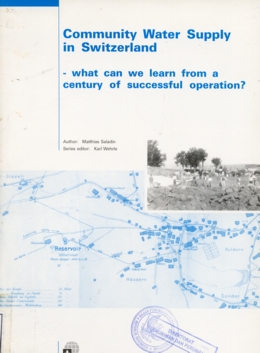
Community Water Supply in Switzerland: What can we learn from a century of successful operation?
Matthias Saladin
06 Mei 2008
1.249
In the last decade there has been a marked shift towards decentralisation in many developing countries as responsibilities are passed from national administrations to local authorities. In many places this shift to a local approach has left the communities isolated and struggling. Many infrastructures projects are in difficulties because of the lack of organisational support and know-how. In Switzerland, rural communities have developed and managed their own water supply networks for a long time – in some cases over 100 years. There may be lessons that have been learned in Switzerland over this period that could be helpful – if properly adapted – to communities in developing countries as they take responsibility for their own systems.
They management of water supply schemes in Switzerland is very much the responsibility of the individual communities. In many villages these systems were initiated before the end of the nineteenth century and have proved to be appropriate and sustainable over a long periode of time. This publication is not an attempt to promote the ’Swiss system’ as a model for developing countries, but rather seeks to recount some experiences that may be helpful or relevant. Even if the Swiss approach cannot be exported as it is, there still may be some lessons to be learned from more than a century of experience. These shall be pointed out and illustrated in this publication.
The study on hand focuses on villages – settlements of up to 10.000 inhabitants. The history of village water supply systems is quite different from the experiences of the cities, which are beyond the scope of this study. The goal of this publication is to pass on important Swiss experiences to policy- and decision makers and practitioners in other countries, especially in the South. For this purpose, a set of case studies was selected to represent a wide range of different organisational arrangements.
There are two important concepts underlying this study: the ’household-centred approach’ (HCA) and ’balanced development’. (These are described briefly below). The ’household-centred approach’ is a concept that puts the household in the centre of infrastructure projects such as water supply networks or sewers. The idea beneath this concept is taht any decision about water supply or sanitation should attempt to solve the problems as close to the household level as possible. Only if a problem cannot be tackled on one level should a solution at the next level up be considered. In this way more decentralised, bottom-up solutions can be provided, in the hope that they will be more sustainable than the existing ones.
’Balanced development’ is a strategy that takes into account the many different aspects of development projects. The various fields of focus are: social, institutional, economic, and technological aspects, and rules and regulations, knowledge and skills. Any project should be assessed by its implications in all these fields. Additionally, there are environmental issues, which typically are addressed throughout all fields of focus. The present report is structured along the tematic fields of the balanced development strategy.
Contents:
Introduction
Environment and Water
Overall Data for Switzerland
Institutional Aspects
Economic Aspects
Social Aspects
Technological Aspects
Rules and Regulations
Skills and Knowledge
Series of Case Studies:
Rehetobel: A village administration in charge of the water supply network
Wittenbach: Where a club for a few evolved into a co-operative for all
Weinfelden: A municipal administration in charge of the water supply network
Dudingen: Where a company manages the water supply network
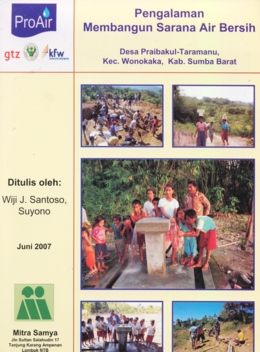
Pengalaman Membangun Sarana Air Bersih: Case Study Pro Air di Desa Praibakul dan Taramanu Sumba Barat
Wiji J. Santoso, Suyono
Th.
1.565
Buku ini berisi hasil studi keberhasilan program Proair dalam membangun sarana air bersih di Desa Praibakul-Taramanu, Kecamatan Wonokaka, Kabupaten Sumba Barat, Nusa Tenggara Timur.
Daftar Isi:
A. ProAir Di Nusa Tenggara Timur
A.1 Latar Belakang
A.2 Tujuan Khusus ProAir
A.3 Prinsip Kerja ProAir
A.4 Persyaratan Kerjasama ProAir
B. Pendekatan
B.1 Survey, Informasi Lapangan
B.2 Mobilisasi Masyarakat
B.3 Faktor Pendukung (Kepemilikan Sumber daya, Status Lahan)
B.4 Manajemen Keuangan dan Perkiraan Biaya
B.5 Proses Konstruksi, Jangka Waktu
B.6 Penilaian Pelatihan
B.7 Penguatan Kelompok untuk Kesinambungan
C. Gambaran Umum Lokasi dan Kelompok Sasaran
C.1 Gambaran Umum Lokasi
C.2 Kelompok Sasaran SAB ProAir
D. Keberhasilan Di Lokasi
D.1 Sistem Sarana, Jumlah dan Jarak Antar Bangunan
D.2 Proporsi Penduduk/ Rumah Tangga Pengguna
D.3 Total Biaya dan Biaya Per Rumah Tangga
D.4 Jangka Waktu Pembangunan
D.5 Manfaat SAB ProAir Desa Praibakul-Taramanu
D.6 Kecenderungan Perubahan
D.7 Perbandingan dengan Intervensi Program Sebelumnya Di Lokasi
E. Perencanaan
E.1 Operasional dan Pemeliharaan Oleh Kelompok
E.2 Pendidikan Kesehatan oleh ProAir dan Instansi Terkait
E.3 Pokja AMPL Berbasis Masyarakat, Kebutuhan Dukungan Luar
F. Temuan Utama
F.1 Kemauan dan Kemampuan Kontribusi Keuangan Masyarakat Miskin untuk O&M
F.2 Aturan Penggunaan Sarana, Penerapan Aturan dan Sanksi Pelanggaran
F.3 Kepemimpinan, Kaderisasi Personal dalam Kelompok
Lampiran-Lampiran Case Study ProAir Desa Praibakul dan Taramanu
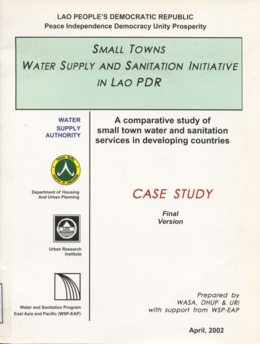
Small Towns Water Supply and Sanitation Initiative in Lao PDR: A Comparative study of small town water and sanitation services in developing countries
Th.
1.010
Table of Contents:
Acknowledgments
Table of Contents
Appendices
List of Acronyms and Abbreviations
Introduction
National Context: Small Towns in Lao PDR
National Strategy and Principal Stakeholders in the Sector
Case Study Methodologies
Technical Assessment
Institutional Arrangements
Financial Assessment
Social Assessment
Recommendations
Web Links
